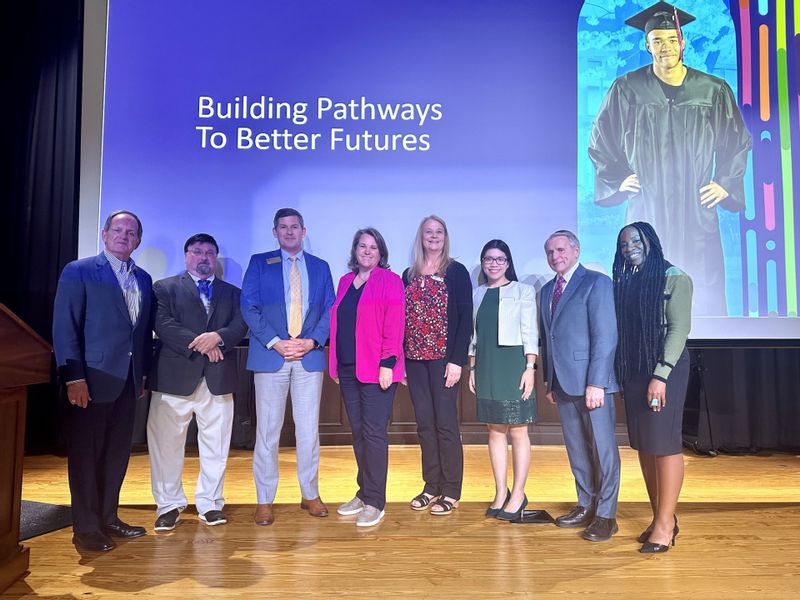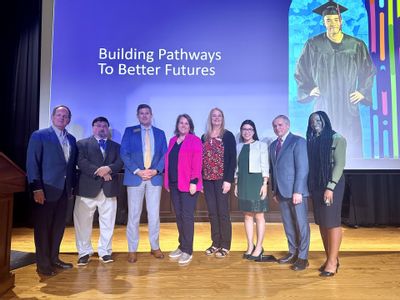Iredell Ready Workforce Forum Highlights Educational Progress and How Artificial Intelligence Is Accelerating the Need for Workforce Development Strategies

The Iredell Ready Workforce Forum, presented by Burroughs Welcome Fund and the North Carolina Science, Mathematics, and Technology Education Center brought together key community leaders, elected leaders, educators, and industry representatives to discuss the progress and future goals of educational attainment in Iredell County. The event featured notable speakers, including Jenn Bosser, President & CEO of the Iredell Economic Development Corporation, Senemeht Olatunji, Regional Impact Manager, and Gina Zhang, Director of Strategic Initiatives, of myFutureNC, and keynote speaker Dr. Bill Daggett, founder of Successful Practices Network and a nationally recognized speaker and expert on education.
Iredell Ready Achievements: • Economic Growth: Iredell County has seen a 35% increase in the average wage from 2018 to 2023. • Educational Attainment: The high school graduation rate has increased from 90% in 2021 to 91% in 2023. The percentage of residents with a degree or credential has risen from 51.4% to 54.5%. • Student Credentials: Credentials earned by high school students have increased from 1,200 to 5,663. • Enrollment Growth: Annual student enrollment at Mitchell Community College (MCC) has increased year over year, with a 9% to 15% increase in the Spring of 2025, outpacing the state average of 5%. • Postsecondary Plans: More than 70% of high school graduates plan to enroll in a postsecondary institution.
Iredell Ready focuses on building pathways to better futures through increased industry engagement and collaboration with K-12 initiatives. The program was launched by a partnership called the Iredell Industry & Education Alliance. At the forum, Iredell Ready announced a collaboration with myFutureNC and The Hunt Institute to further educational attainment goals. Additionally, Iredell Ready launched a Corporate Partners Investment opportunity to engage industry in driving strategic workforce priorities.
myFutureNC Overview: myFutureNC presented the State of Educational Attainment in North Carolina and Iredell County progress towards the goal of having 2 million North Carolinians aged 25-44 with high-quality credentials or postsecondary degrees by 2030. Key points from myFutureNC’s presentation include:
• Statewide Progress: Since the establishment of myFutureNC, the number of residents aged 25-44 holding a degree or credential has increased from 1,450,249 in 2019 to 1,664,892 in 2023, representing a 15% growth.
• Attainment Goal: The target is to reach 2 million by 2030, with a current shortfall of 13,279 individuals.
• County Progress: 79 out of 100 counties have increased their attainment rates since 2019, with Iredell County showing a 3.1 percentage point increase from 51.4% in 2019 to 54.5% in 2023.
• New Standardized Language for the State of Educational Attainment: myFutureNC revealed a new standardized language to measure the state of educational attainment across all 100 North Carolina counties with a goal to ensure that every county sets a local attainment goal, creates a plan, and executes it to increase educational attainment.
• Iredell is Attainment Ready: Iredell County has achieved the status of “Attainment Ready”, along with 8 other counties across the state to achieve this level. The county's efforts in fostering cross-sector collaboration and building comprehensive plans are aligned with the broader state goals.
Despite the progress, there is more work to do to close the gap in educational attainment and ensure that all residents earn a living wage. Approximately 43% of Iredell County residents aged 25-44 do not hold a postsecondary degree or credential, and many do not earn a living wage.
The forum discussed various initiatives to address these challenges, including enhancing K-12 education, promoting apprenticeships and internships, and increasing corporate engagement in workforce development efforts. The focus is on creating a comprehensive and sustainable plan to increase educational attainment and workforce readiness. Cross-sector collaboration is essential, with efforts to engage local government, industry, and educational institutions in building a skilled workforce.
Dr. Bill Daggett, a national education advocate, delivered a keynote address focusing on the future of Artificial Intelligence (AI) and its impact on education and the skills needed for future jobs. He emphasized that "most workers will not be replaced by AI. They will be replaced by a person with skills that AI does not possess."































